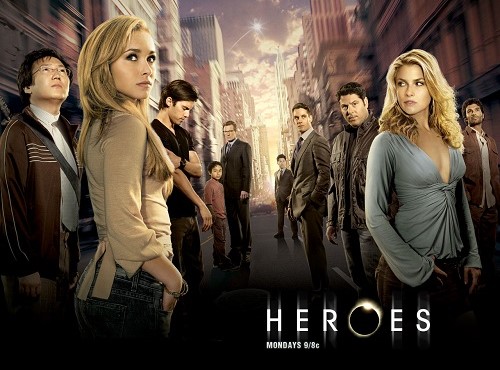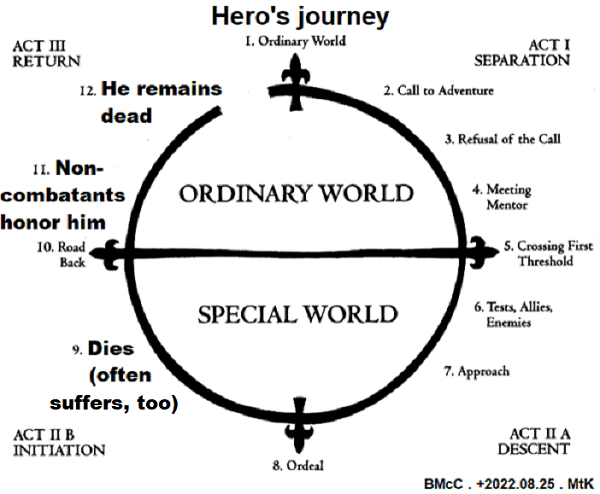Human resources and heroes
"There's one born every minute, as the old saying goes". I mean, like, man, I'm cynical. But when I do a search for "Heroes" on both Bing and Google I was expecting to find pictures of blood and guts stuff or at least Fourth of July Parades to satire.
What did I find as Top Rated #1: Some damned TV show. Maybe kids really do not know that WW II is not the latest version of Weight watchers and that Pearl Harbor is not a resort in the Caribbean which they only know as a destination of Jet Blue somewhere (you board the plane and it takes you there)? Even I'm not that cynicsl. Let's see: 2 attractive young white ladies ("hot chicks"). A token Asian male. Yeah maybe an oriental kid. One very Southern Italian olive skin slightly sleazy lothrao type, maybe? But no black people, are there? Call the Color Cops!
* * * * * * *
My concern is with "real" heroes, and that I do not want to be one. My idea if a real hero is the sailor who went into the reactor room on a Soviet nuclear submarine to shut done the reactor which was about to explode → and when he had finished the job and was ready to get out they could not get the door open to let him back out. He might have died later or sooner from radiation poisoning or cancer, but even he did not sign up to spend several days stuck in that hot eactor chamber awaiting certain death from starvation or something else like that, maybe the heat would have steamed him lie a lobster?
Hero glorificaton is sentimental: it's a bit like the foolish cliche: "Curiosity killed the cat. Satisfaction brought it back." NO: "Curiosity killed the cat. That was game over for the cat." There is a great Japanese novel from the early 20th centuuy, "I am a cat", by Natsume Soseki, which makes precisely this point. Neither celebrating dead heroes nor crying about them does the dead heroes any good, but it does encourage sentimental women to send their husbands and sons to war to become more dead heroes for them to celebrate and cry about. Boo, hoo!
* * * * * * *
Hypthetically, I can imagine that a person whose social surround had richly nurtured him (her, other) all their life might be willling to (leaving metaphysics aside for the moment) give up their life to save someone, especially someone who had richly nutrured them in their living. But My environment did not earn it. Therefore I feel no wish to sacrifice my self for them.
Of course such an unnurturing social environment wiould likely give me the forced choice of doing for them what they don't deserve or killing or at leas ostracizing me anyway for being a selfish bastard when they merely selflessly asked me just to dis for their selfiess need to live and to enjoy themselves,when I only have selfish wants not selfless needs like they do. What they should do in such a situation, of course, is tell me:
"We understand we never did anything for you. We now we accept the price for choices we made. We leave this world apologizing for the hurt we did to you and we also accept that doesn't do you any good either."
* * * * * * *
[Subtitle: How we could have lost the war] "What did you do during the war, daddy?"" "I worked at a desk. "Gee, daddy. All the other kids in my class had daddies who served in the war. Some of them died in France and are buried there. Others came home wounded and will be in a hospital for the rest of their lives, or have only one leg. You sat at a desk, daddy?" "I did, daughter." "And what did you do at night, daddy?" "I came home and ate dinner with mommy, and then we went to bed and I went back to work again in the morning." "And what did you do there, daddy?" "I broke the enemy's secret code." "What's that, daddy?" "It's how the enemy kept us from knowing what they were doing. But I figured it out and then we knew what they were doing but they didn't know we did." "That sounds complicated, daddy. My classmates' daddies went in trenches and fought the enemy, and risked their lives to defend their wives and us chldren from the evil enemy soldiers." "They did, daughter." "But you didn't?" "What I did was very important. It helped us win the war." "But I don't understand, daddy. How could you have been helping win the war when you came home for dinner each night while the other daddies were being shot at in the trenches." "My work made a big difference to our winning the war, daughter." "I don't know, daddy. I don't see how anything could be more important than fighting the enemy soldiers over in France who wanted to do awful things to mommies and to us children. We study about that in school. I'm not sure about you, daddy. I think you should have fought the very bad enemy soldiers like other daddies."
 |
 |
 Welcome
Welcome


